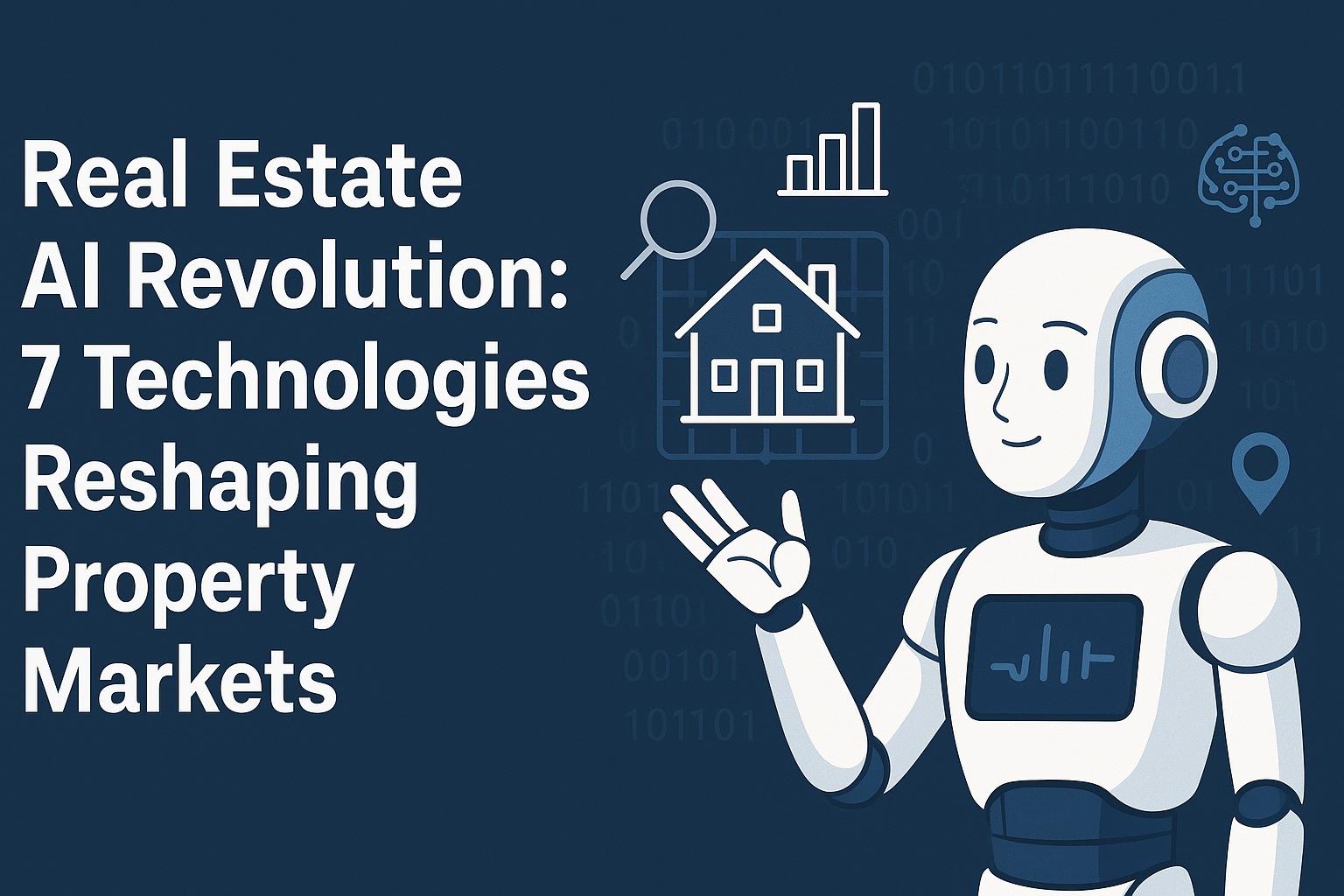How Artificial Intelligence is Revolutionizing the Real Estate Industry
Did you know that 73% of real estate companies using AI report improved customer satisfaction and 61% see increased operational efficiency? Artificial Intelligence is no longer the future of real estate – it’s transforming the industry right now. From predictive analytics that forecast market trends to AI-powered chatbots that provide 24/7 customer service, intelligent technologies are reshaping how we buy, sell, and manage properties.
In this comprehensive guide, we’ll explore the cutting-edge applications of AI in real estate, examine the latest PropTech innovations, and reveal how forward-thinking firms are gaining competitive advantages through intelligent automation. Whether you’re an investor, agent, or property manager, understanding these AI-driven changes will help you navigate the evolving landscape of real estate technology.
Ready to Transform Your Real Estate Business with AI?
Schedule your no-obligation discovery call today and learn how our AI experts can help you automate operations and boost profitability.
5 Transformative AI Applications in Real Estate
1. AI-Powered Property Management Systems
Modern property management has been revolutionized by AI through:
- Automated tenant screening using predictive algorithms that analyze credit history, rental patterns, and social data
- Smart maintenance systems that detect issues before they occur using IoT sensors and machine learning
- Dynamic pricing tools that optimize rental rates based on real-time market conditions
According to JLL research, properties using AI management systems see 22% lower vacancy rates and 18% higher tenant retention.
2. Intelligent Chatbots for 24/7 Customer Service
AI chatbots are transforming client interactions by:
- Handling 80% of routine inquiries without human intervention
- Providing personalized property recommendations based on buyer preferences
- Scheduling viewings and following up with potential clients automatically
Zillow’s AI assistant handles over 3 million conversations monthly, with 40% of users preferring chatbot interactions for initial inquiries.
3. Predictive Analytics for Smarter Investments
AI-driven market analysis tools help investors:
- Identify emerging neighborhoods with high growth potential
- Predict property value fluctuations with 92% accuracy (compared to 76% for traditional methods)
- Optimize portfolio performance through machine learning algorithms
4. Automated Valuation Models (AVMs)
AI valuation systems provide:
- Instant property appraisals using millions of data points
- Reduced human bias in valuation processes
- Continuous market monitoring for real-time price adjustments
AVMs now account for 35% of all residential valuations in the U.S., with error rates below 2% for standard properties.
5. Generative AI for Property Development
Architects and developers are leveraging AI to:
- Generate hundreds of design options in minutes
- Optimize space utilization and energy efficiency
- Create photorealistic renderings and virtual staging
The PropTech Revolution: AI Meets Real Estate Innovation
Blockchain and Smart Contracts
AI-enhanced blockchain solutions are:
- Reducing closing times from weeks to days
- Eliminating 85% of traditional paperwork
- Providing immutable transaction records
Virtual and Augmented Reality
AI-powered visualization tools enable:
- Interactive 3D property tours with personalized decor options
- Neighborhood simulations showing future development impacts
- Augmented reality staging of empty properties
Future Trends: Where AI in Real Estate is Heading
Hyper-Personalized Customer Experiences
Future AI systems will:
- Anticipate client needs before they articulate them
- Create completely customized property recommendations
- Adjust communication styles based on individual preferences
Integrated Smart Building Ecosystems
The convergence of AI and IoT will enable:
- Self-optimizing buildings that adjust to occupant behaviors
- Predictive maintenance systems for entire developments
- Energy networks that automatically balance usage across properties
Ethical AI and Regulatory Developments
Key considerations include:
- Developing standards for algorithmic transparency
- Ensuring fairness in AI-driven lending decisions
- Protecting sensitive client data in machine learning systems
FAQ: AI in Real Estate
How accurate are AI property valuations?
Leading AVMs now achieve 95-98% accuracy for standard residential properties in mature markets, though unique properties may still require human appraisers.
What’s the ROI for AI in real estate?
Firms report 3-5x ROI through reduced operational costs, increased sales conversions (typically 15-25%), and higher property values from optimized management.
How does AI prevent bias in real estate?
Advanced algorithms are being trained to recognize and eliminate human biases in pricing, lending, and tenant screening, though ongoing monitoring is essential.
What skills do agents need for AI-driven real estate?
Success now requires data literacy, the ability to interpret AI insights, and high-touch relationship skills that complement (not compete with) technology.
Embracing the AI Transformation in Real Estate
The integration of artificial intelligence in real estate represents more than technological advancement – it’s a fundamental shift in how properties are bought, sold, and managed. From predictive analytics that anticipate market shifts to generative AI that reimagines property design, these tools are creating unprecedented opportunities for those ready to adapt.
As we look ahead, the most successful real estate professionals will be those who harness AI as a collaborative tool rather than viewing it as competition. The question isn’t whether AI will transform real estate, but how quickly you can implement these innovations to serve your clients better and grow your business in this new era of intelligent property technology.



